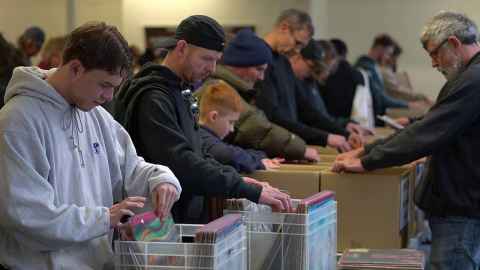The headlines were jarring. Radio bFM was selling off part of its record collection to stay afloat. So how did it go?

When 6,000 albums were laid out on the trestle tables on 19 August for the record fair at bFM, there was a little bit of sadness.
But also, music lovers had to admit the sell-off hit the sweet spot between philanthropy and excitement at the prospect of getting their hands on some previously loved vinyl.
All purchases from the vinyl sale went towards boosting the coffers of the radio station and the move was described as a 'last resort' by bFM general manager Tom Tremewan in August.
But maybe bFM is just a super-smart marketer. As well as the record sale getting close to Tom's optimistic target, the radion station's Give-a-Little page has been going gangbusters following the publicity around bFM selling off some of its record collection.
From 1 August until the time UniNews went to print, Give-a-Little had raised more than $15,000 in visible donations, not including the private amounts given. Listeners young and oldish were happy to part with funds to save the day, with some opting to have their name and song choice read out on air for a few dollars. From a request for Hüsker Dü for $100 to $5 for Electric Wizard's 'Vinum Sabbathi', the asks were as wide-ranging as the donations and a bFM playlist. There was $1,000 from someone who said a world without bFM would look pretty much upside down.
"We are proud of our community for rallying around us and supporting the station in a time of desperate need," says Tom. "Many customers found hidden gems and got away with a steal - purchasing $20 'bargain' records and then finding out some of those retail on vinyl reselling sites for $200 to $800. But we know those records are going to homes that will love them, not for their retail value, but for their cultural value."
Tom says no one wanted to sell the vinyl but it had to be done.
"It was something we needed to do to sustain ourselves. It's the big picture. It wasn't an easy decision, but it's a cash injection."
So many of our volunteers, DJs and journalists have gone on to have really
significant roles in music, broadcasting, television, art, and the like.
Rachel Ashby, bFM Breakfast Radio host
One place that cash is needed is to upgrade the radio station's backroom servers and replace "old, clunky" computers.
Rachel Ashby, Campus bFM's Breakfast host for four years, says the station is important not just for its support of independent music, but as a training ground for journalists, commentators, technicians, advertising creatives and artists.
The BA/BFA Honours graduate started at bFM in a volunteer role, the same as the backbone of its workforce. She then ended up hosting an arts show and is now one of 12 paid staff, two contractors and around 170 volunteers.
"In an ideal world, bFM would be more sustainable and that's what we're working towards," Rachel says. "Supporting the station is important because if we lose something like this, there's no way to replicate it."
As well as the vinyl sale and Give-a-Little, there's the world famous - in Auckland - bCard.
"It's a sort of Patreon subscription service where people pay $4.20 or $9.50 a month - or $100 - depending on financial circumstances. It's a way of saying, 'I support this station and I want to just keep it ticking over'. It makes a massive difference for us to get that type of support."

We are proud of our community for rallying around us and supporting the station in a time of desperate need.
Tom Tremewan, general manager of bFM University of Auckland
Campus bFM is owned by the AUSA Media Trust, which is owned by the Auckland University Students Association. As well as support from AUSA, bFM gets some funding from NZ On Air.
Part of the station's mandate is to be financially sustainable.
"We have a three-pronged strategy to being financially sustainable. We have a bunch of plans and schemes on the horizon that also include alumni and the whole community of bFM."
Rachel says since starting out as Radio Bosom in 1969, bFM has had a big part to play in the culture of Tāmaki Makaurau.
"Our listeners are people who really care about independent music. They care about independent journalism and alternative culture.
"We're a platform for interesting ideas, and that independence is a big tenet for us."
The station's creative advertising department is renowned and bFM has also been a media training ground for some of the best-known names in arts, fashion and mainstream media, including Francis Hooper, Simon Grigg, Murray Cammick, Jeremy Wells, Wallace Chapman, Mikey Havoc, Paul Casserly and Charlotte Ryan. (The list is long ... visit the 95 bFM Historical Society on its website.)
Charlotte, RNZ's Music 101 host on Saturdays, popped back into the studio recently and said she felt like she was coming home. "I wouldn't have been the person I am today without bFM."
Says Rachel: "So many of our volunteers, DJs and journalists have gone on to have really significant roles in music, broadcasting, television, art, and the like. Our people are united in shared values, that's the best way to explain it."
Values worth preserving.
By Denise Montgomery
This story first appeared in UniNews September 2023.






